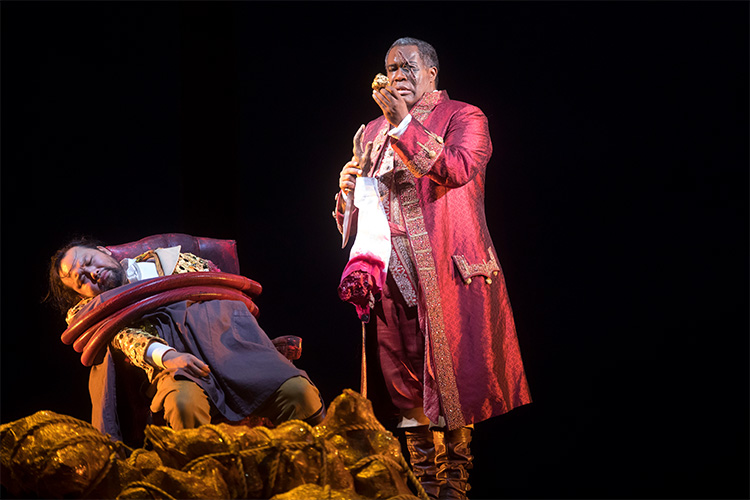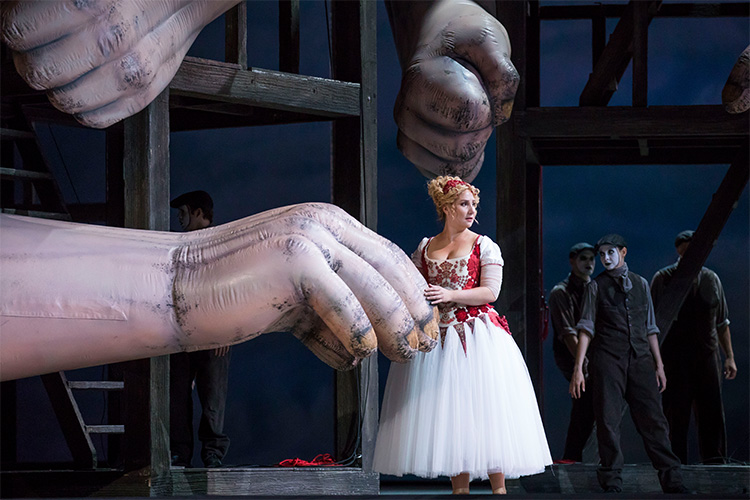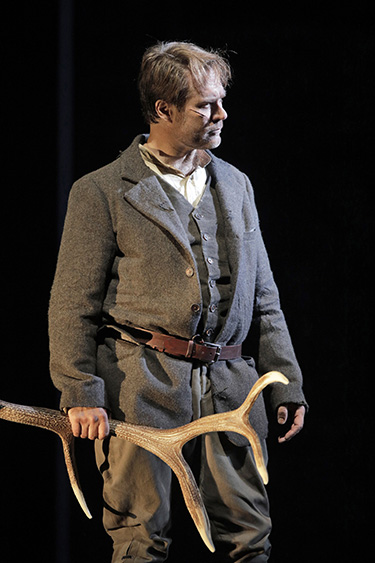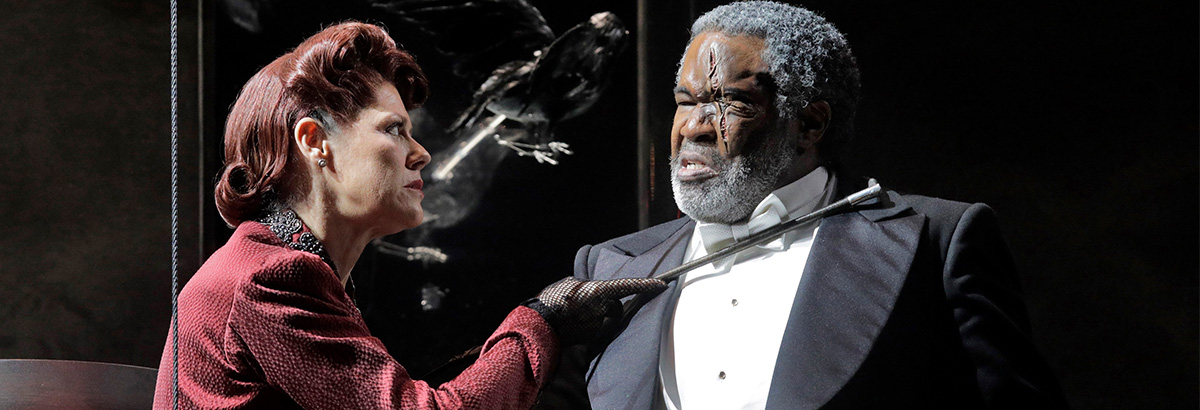April 06, 2020
Who owns the gold?
Richard Warren Shepro, a board member of both Lyric and the Ryan Opera Center, is an international lawyer, professor, and writer. A former editor of The Harvard Law Review, he belongs to the third of four generations of his family who have been Lyric regulars since the company’s inaugural season in 1954. Here he writes about legal issues in The Ring of the Nibelung.
When Lyric general director Anthony Freud asked me to write about legal issues in The Ring of the Nibelung, I realized that he’d somehow known (though it had not yet occurred to me) that ever since we had simultaneously – decades ago and not yet acquainted – attended the famous Ring cycle at London’s English National Opera, I had been thinking about this topic. The more I ponder the Ring and the law, the more questions I have.

We first discover the “Rhine gold” in the very first scene of the Ring cycle. The Rhinemaidens are guarding the gold, but by the end of the scene it’s been stolen by Alberich. The first – and ultimately unanswerable – question, then, is, who actually owns the gold? And does anyone have a legitimate right to use the ring and the magic helmet (the Tarnhelm) that Alberich orders Mime to fashion from the gold?
Many assume the gold belongs to the Rhinemaidens because of the strong sense (present in the musical score) that Alberich is a thieving, evil dwarf. I anticipate Alberich’s guilt right from the disturbing chromatic motif in the strings that accompanies his entrance. However, Wagner’s text never says the Rhinemaidens own the gold. They may only be caretakers of a sort of natural resource. In law, naturally occurring resources, such as a rough jewel, often become property of whoever has found the jewel or used his artistry to fashion the raw object into something still more valuable, like a carefully cut and polished gemstone or, in this case, the Tarnhelm and the ring. Mime, Alberich’s brother and enslaved Nibelung who forges these objects, clearly has no rights to them.

Alberich may seem like a thief, but he makes a decisive bargain: in stealing the gold to make the ring and become all-powerful, he pays his price by renouncing love, but paying a specified price is not consistent with theft. Is his metaphorical self-castration a payment that the Rhinemaidens would have found to benefit them? If Alberich offered nothing of value to Wagner’s carefree Rhinemaidens, can the bargain be legally binding?
To know who is in the right, legally, you must start with the question of what law to apply. Legal philosophers often describe two kinds of law: positive law (“man’s law”) and natural law, the latter thought to exist regardless of what laws are enacted by a particular society. Natural law is sometimes described as “God’s law,” or as a set of “unalienable rights”; for example, the idea that all people possess rights they cannot “alienate,” or transfer, to anyone else, such as life and liberty. A natural-law question in the Ring is whether the Rhinemaidens’ connection to the gold is so primal that they cannot legally transfer it at any price. Alternatively, mere caretakers would also lack authority to “alienate” the property despite Alberich’s sacrifice. If they could not legally part with the gold – and Alberich knew it – then he was a thief. But what if he did not know they lacked the authority? Wagner, who defied convention in his personal life, regarded Alberich as malicious, but not a thief, and as having legitimate complaints against the gods.

The Rhinemaidens teed up the bargain for Alberich when they let slip that their mysterious father had said the gold could be taken and forged into a powerful ring, but only by the unimaginable character willing to renounce love. Nevertheless, after he accepts this gambit and takes the gold, they scream (at least, in Wagner’s stage direction) and try to stop him. This is not consistent with the formula that led him to renounce love. We don’t know the identity of the Rhinemaidens’ father. Unlike most of the Ring’s characters, they don’t exist in Wagner’s Norse and German mythological sources – Wagner invented them. Wotan is certainly not the father (Wagner is not shy in revealing that Wotan fathered Siegmund, Sieglinde and all the Valkyries), but he might be some kind of river god, or the Rhine itself. If a god, did that god create the gold, and therefore have the authority to establish (positive) laws that allow one who renounces love to take the gold? Or is Wagner suggesting that there was somehow a natural-law right for someone to sacrifice intimacy in return for whatever treasure glistened in the deep?
Some British writers have tried to analyze legal issues in the Ring with a strange literal zeal, assuming for some reason that the legal framework is a combination of the laws of England and – since the gold was found in the water – international maritime law. Leaving aside that the law of the high seas does not apply to the Rhine, I would argue that Wagner’s story, with its huge mythological arc, should be interpreted essentially based on natural law alone.

Unfortunately, as so often with Wagner, that still leaves many issues murky. The dispute between the gods and the giants is not a question of natural law. Wotan and his trickster partner Loge hired the giants as real-estate developers to build Valhalla. It should be, purely and simply, a question of real-estate rules and a bargain made between an owner (gods) and a building contractor (giants) who frets about not getting paid. Not having access to the wording of the contract, we don’t know whether the applicable (positive) law is the law of gods or the law of giants, but the rules that are implied seem standard enough.
This real-estate negotiation is at the heart of the Ring, not just because it’s central to the plot, but also because it initiates the Ring’s exploration of the ambiguous relationship between ethics and legality. Deceit and treachery abound. The existence of these negotiations suggests a developed, orderly legal structure in a world where advanced economic transactions are possible. However, whether just stuffed with bad manners or actually illegal, negotiations in the Ring are the purest of examples of bad faith. The deception starts even before Das Rheingold begins, when Wotan and Loge have already promised Wotan’s sister-in-law Freia as payment to the giants for their efforts. Natural law should certainly prohibit the sale of a goddess, voiding the contract. Yet the giants rely on this promise – which Wotan and Loge never intended to keep in the first place. When the giants appear onstage (accompanied by the ferocious rhythm in the timpani that characterizes their leitmotif), it becomes clear that the gods need to find replacement payment in a hurry. It’s no surprise that their first inclination is to trick someone else: Alberich, whom they persuade to turn himself into a frog so they can take the gold. This is theft no matter who owns the gold, but the deceit is applauded because the victim is despised.
Natural law would be far more concerned over the treatment of Freia, who is ransomed for the gold, than over whether Alberich took the gold as part of a contract or as a thief, or how Wotan and Loge tricked Alberich. Though a goddess, Freia is treated as an object with no rights, and the other gods’ acquiescence in her predicament may be a reason it is just, or legal, for them ultimately to be punished in the destruction of Valhalla at the conclusion of Götterdämmerung. (Wotan and Loge were foolishly confident they could trick the giants out of their payment, forgetting the untenable risk of losing Freia, who provides the golden apples on which their eternal youth depends.)

Another natural-law question involves the incest of Siegmund and Sieglinde in Die Walküre. After their love duet – so poignant and universal and so redolent of longing, destiny fulfilled, and danger uncovered – Siegmund, armed with his magical sword Nothung, is ready for battle with Hunding. Wotan wants to protect him, but he loses his long debate with his consort Fricka, who wants to punish incest (as well as infidelity). Wotan enters into an agreement with her not to intervene to save Siegmund. For once, Wotan actually abides by his bargain and is therefore unable to protect his own children. This is curious on several levels. Why does Wotan, who in his own fateful bargain had traded an eye for cosmic wisdom, make so many bad decisions? Fricka argues not merely that incest is wrong (natural law); she also appeals to the laws of the gods supporting marriage vows, written down and preserved by Wotan on his own staff (positive law). For Wagner, incest was more complicated than for Fricka. In a passage for his Ring libretto that he left out when composing the music, Wagner had Wotan argue rather plaintively that love had “nurtured” the “twin-born pair...within their mother’s womb; unwittingly they lay there once, unwittingly they love each other now.” And in one of his many works of literary criticism, Wagner argued that in Sophocles’s great tragedy Oedipus Tyrannus, Oedipus wasn’t guilty of incest because he didn’t know that the woman he was marrying was his mother. This is similar to the innocence of Siegmund and Sieglinde, who didn’t know they were twins, though the situations aren’t quite analogous: Sieglinde has noticed that Siegmund seems like the image of herself that she has seen in still water.
The audience, and probably Wagner as well, may not have a consistent approach to honesty. If you don’t allow your legal judgment to be influenced by the music, you’ll probably decide that the most honest characters in the Ring are the giants. This is consistent with their portrayal in Norse mythology as far more honorable than the gods. The giants are far from perfect – they take a goddess hostage, and Fafner does murder his brother – but they’re credible, consistent negotiators, and in Siegfried, the dying Fafner even has the ethical sense to warn Siegfried of impending treachery.
Law students, and especially their professors, often find that questions posed about difficult legal issues can be more interesting than the answers. In 1853 Richard Wagner wrote to Franz Liszt, “Mark well my new poem – it contains the world’s beginning and its end.” We are all fortunate that within that compendium we can find deep questions about natural law alongside other questions and eternal puzzles, psychological, ethical, mythological...all mixed in with the musical score to cast the inexhaustible spell of the Ring.
